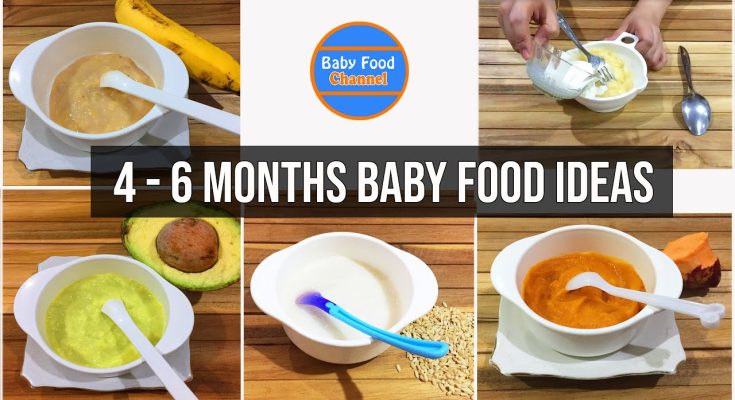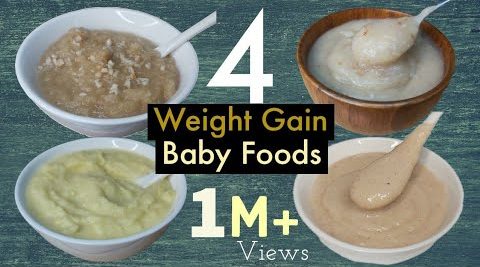Introducing solid foods to your baby is a big milestone, and doing it at the right time is essential for their health and development. At around 4 months of age, many babies are ready for their first taste of solid foods. However, it’s important to follow your pediatrician’s guidance and ensure that your baby is developmentally ready to start eating purees.
At this age, babies are typically just beginning to learn how to swallow food. Purees are the best option since they are easy for your baby to digest and introduce a variety of flavors and nutrients. In this article, we’ll go over what foods are safe for a 4-month-old, provide some baby puree recipes, and give you tips for introducing solids to your little one.
Signs Your Baby is Ready for Solid Food
Before starting solids, it’s essential to ensure that your baby is ready. Pediatricians recommend waiting until about 6 months, but some babies are ready at 4 months. Keep an eye out for these signs:
- Head and Neck Control: Your baby should be able to hold their head up steadily and sit with support.
- Interest in Food: Your baby may watch you eat or show interest when you’re eating.
- Decreased Tongue Thrust Reflex: At around 4-6 months, babies start to lose the tongue thrust reflex, which pushes food out of their mouths.
- Doubling Birth Weight: Babies should be around double their birth weight, which generally happens around the 4-6 month mark.
First Foods for a 4-Month-Old Baby
At 4 months, your baby’s digestive system is still developing. For their first solid foods, it’s essential to start with single-ingredient purees. These foods should be mild, easy to digest, and free of allergens. Start with just one food at a time, allowing 3-5 days in between to ensure there are no allergic reactions.
Some of the best first foods include:
- Single-grain Baby Cereal: Many parents start with rice cereal or oatmeal. Mixing it with breast milk or formula helps introduce your baby to the new texture.
- Pureed Vegetables: Soft vegetables like sweet potatoes, carrots, or peas are good choices. They are packed with vitamins and nutrients.
- Pureed Fruits: Apples, pears, and bananas are sweet and gentle on your baby’s stomach. These are excellent sources of vitamins.
- Pureed Avocado: High in healthy fats, avocados are a great option for supporting brain development.
Baby Puree Recipes for 4-Month-Olds
When preparing purees, it’s essential to keep the texture smooth and free of chunks that might cause your baby to choke. Start with a thinner puree and gradually thicken the texture as your baby gets used to eating solids.
1. Sweet Potato Puree
Sweet potatoes are packed with essential nutrients like vitamin A, which supports your baby’s immune system and vision. They are naturally sweet and easy to digest.
Ingredients:
- 1 medium sweet potato
Instructions:
- Peel and cube the sweet potato.
- Steam or boil the cubes until soft (about 10-15 minutes).
- Once tender, mash the sweet potato using a fork or blend in a food processor until smooth. Add a little water, breast milk, or formula to reach your desired consistency.
2. Apple Puree
Apples are a great first fruit for babies. They are easy to digest and have a mild, sweet flavor that babies tend to love.
Ingredients:
- 1 medium apple
Instructions:
- Peel and core the apple, cutting it into small chunks.
- Steam or boil the apple pieces for 5-10 minutes until soft.
- Puree the apples using a food processor or blender, adding water or breast milk for a smoother texture.
3. Carrot Puree
Carrots are rich in vitamin A and beta carotene, which are important for eye health and overall growth.
Ingredients:
- 2 medium carrots
Instructions:
- Peel and chop the carrots into small pieces.
- Steam or boil the carrots until soft (about 10-15 minutes).
- Blend the carrots into a smooth puree, adding water, breast milk, or formula to adjust consistency.
4. Pear Puree
Pears are another great fruit option for 4-month-old babies. They’re naturally sweet, mild, and packed with fiber.
Ingredients:
- 1 ripe pear
Instructions:
- Peel and core the pear, cutting it into small pieces.
- Steam the pear for 5-7 minutes until soft.
- Puree in a blender until smooth, adding a little liquid for the desired consistency.
5. Avocado Puree
Avocados are an excellent source of healthy fats that promote brain development. Their creamy texture makes them easy for babies to consume.
Ingredients:
- 1 ripe avocado
Instructions:
- Cut the avocado in half and remove the pit.
- Scoop out the flesh and mash it with a fork or blend it for a smoother consistency.
- Add a little breast milk or formula to adjust the texture if needed.
Tips for Feeding Your 4-Month-Old Baby Purees
- Start Slow: Introduce solids slowly, starting with one food at a time. Wait 3-5 days before trying another food to monitor for any allergic reactions.
- Observe for Allergies: Watch for signs of allergies, such as rash, swelling, or diarrhea, after introducing a new food.
- Watch for Cues: Let your baby guide the feeding process. If they turn their head or close their mouth, they may be full or not ready to eat yet.
- Introduce New Foods Gradually: Begin with mild, single-ingredient purees and avoid adding spices or salt.
- Proper Texture: As your baby gets used to eating purees, gradually thicken the consistency to encourage them to start chewing.
Conclusion
Introducing solids is a big step for both you and your baby. At 4 months, purees are a perfect way to begin this journey, providing your baby with essential nutrients and allowing them to experience new tastes and textures. Remember, every baby is different, so take your time, be patient, and enjoy this exciting new chapter! Always consult your pediatrician before starting solids, especially if you have any concerns about allergies or your baby’s development.



